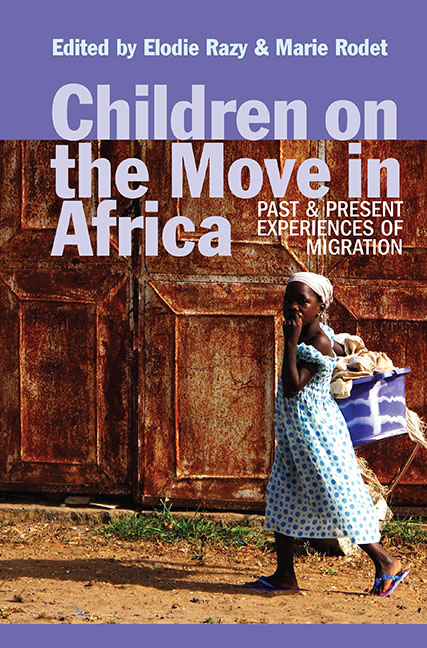Book contents
- Frontmatter
- Contents
- List of Illustrations
- Notes on Contributors
- Preface
- Acknowledgements
- Introduction: Child Migration in Africa: Key Issues & New Perspectives
- Part I CHILD MIGRANTS IN AFRICA: BEYOND THE DILEMMA OF VULNERABILITY v. AGENCY
- Part II BEING A CHILD & BECOMING A GENDERED ADULT: THE CHALLENGES OF MIGRATIONS IN CHILDHOOD
- Part III MOBILITY, IMAGINATION & MAKING NATIONS
- 6. Childhood, Space & Memory: Migrations of the Métis in Madagascar's Central Highlands (Nineteenth & Twentieth Centuries)
- 7. ‘We Were Mixed with All Types’: Educational Migration in the Northern Territories of Colonial Ghana
- 8. India–South Africa Mobilities in the First Half of the Twentieth Century: Minors, Immigration Encounters in Cape Town & Becoming South African
- 9. Education, Migration & Nationalism: Mapping the School Days of the First Generation of Southern Sudanese Nationalist Leaders, c. 1948–1972
- 10. Child Narration as a Device for Negotiating Space & Identity Formation in Recent Nigerian Migrant Fiction
- Bibliography
- Index
9. - Education, Migration & Nationalism: Mapping the School Days of the First Generation of Southern Sudanese Nationalist Leaders, c. 1948–1972
from Part III - MOBILITY, IMAGINATION & MAKING NATIONS
Published online by Cambridge University Press: 25 October 2017
- Frontmatter
- Contents
- List of Illustrations
- Notes on Contributors
- Preface
- Acknowledgements
- Introduction: Child Migration in Africa: Key Issues & New Perspectives
- Part I CHILD MIGRANTS IN AFRICA: BEYOND THE DILEMMA OF VULNERABILITY v. AGENCY
- Part II BEING A CHILD & BECOMING A GENDERED ADULT: THE CHALLENGES OF MIGRATIONS IN CHILDHOOD
- Part III MOBILITY, IMAGINATION & MAKING NATIONS
- 6. Childhood, Space & Memory: Migrations of the Métis in Madagascar's Central Highlands (Nineteenth & Twentieth Centuries)
- 7. ‘We Were Mixed with All Types’: Educational Migration in the Northern Territories of Colonial Ghana
- 8. India–South Africa Mobilities in the First Half of the Twentieth Century: Minors, Immigration Encounters in Cape Town & Becoming South African
- 9. Education, Migration & Nationalism: Mapping the School Days of the First Generation of Southern Sudanese Nationalist Leaders, c. 1948–1972
- 10. Child Narration as a Device for Negotiating Space & Identity Formation in Recent Nigerian Migrant Fiction
- Bibliography
- Index
Summary
On 9 July 2011, South Sudan became the world's newest country, the culmination of a long campaign for self-determination, which drew a line under nearly half a century of civil wars between an Arab and African developed North and a predominantly African and underdeveloped South. From a structural perspective, the conflicts between northern and southern Sudan were predictable. When Sudan gained independence on 1 January 1956, the southern portion of the country lacked social and economic development, and the Sudanese state was largely absent from the region. The size and geography of the territory also favoured irregular warfare, and neighbouring countries were able to provide sanctuary for the rebels. This set the stage for the beginnings of the southern insurgency, which was led by a school-educated southern elite. Among those who first joined the southern resistance was Joseph Lagu, alumnus of Rumbek Secondary School (RSS), southern Sudan's premier educational institution.
This chapter tells the story of RSS, which moulded the first generation of southern Sudanese nationalist leaders, individuals like Joseph Lagu, who joined the southern resistance during the first civil war. The connections between education and elite formation in colonial Africa are well established. As with elsewhere in Africa, missionaries first introduced Western-style education to the Sudan, mainly to boys in order to secure conversion. This type of education provision dovetailed with colonial administrations’ needs for a small group of indigenous administrative officials, and was therefore promoted by colonial states. More often than not, those who went to school were taught in English (or in another European vernacular), the language of the white colonial officials, and they were recognized by other Africans as powerful. As Carol Summers reminds us, schools created and reinforced an African elite of middlemen within colonial African societies. These educated African middlemen got to know colonial institutions as well as African ones, and were therefore able to make demands in a European dominated world. It was this group of educated Africans that eventually negotiated the end of colonial rule, or influenced armed liberation struggles.
In the Sudanese context, Heather Sharkey has already studied the connections between formal education and political and nationalist elites in northern Sudan. Sharkey demonstrates the ways in which Gordon College, the institution that offered the most-advanced secondary education in colonial Sudan, socialized its students, producing a shared culture and a common worldview.
- Type
- Chapter
- Information
- Children on the Move in AfricaPast and Present Experiences of Migration, pp. 175 - 190Publisher: Boydell & BrewerPrint publication year: 2016

